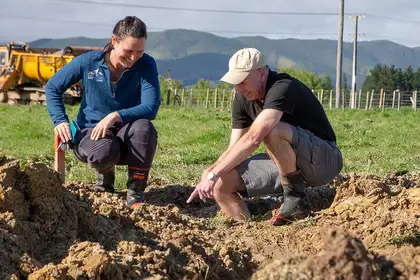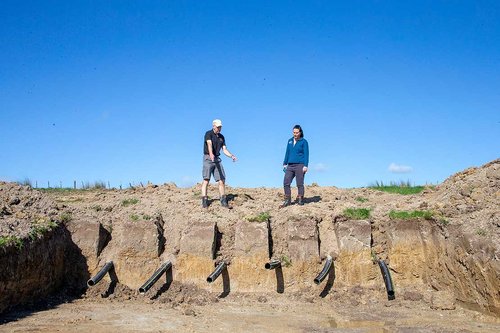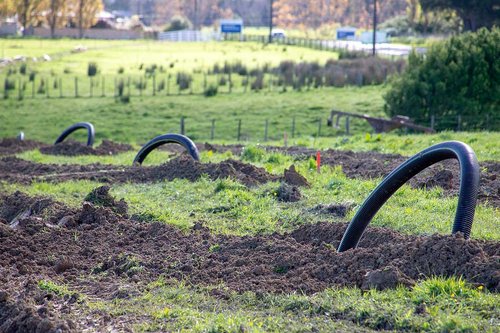
Massey University’s sheep and beef research farm, Keebles, will be a focal point for new nutrient leaching research for sheep and beef farming with the instillation of a sophisticated water and nutrient collection system.
Located just outside of Palmerston North near Massey’s Manawatū campus, Keebles Farm comprises 287.1 hectares. The recently installed system sits underneath the farm’s dedicated research paddocks, and each plot has been equipped with an isolated drainage system, which allows all water to be collected and studied.
Deputy head of the School of Agriculture and Environment Professor Paul Keyon says Keebles Farm will be the first to employ a collection system of this type for sheep and beef research in New Zealand.
The system allows for the collection of soil water from the various isolated research plots at the same time within the research area. This allows the researchers to examine the effects of differing herbage types and / or stocking rates on leaching at the same time on the same type of soil. They will also be able to do this across the seasons and years.

Upcoming projects
The project is being led by Dr Lydia Cranston, Associate Professor Dave Horne, James Milner and Dr James Hanly.
“We are continuing to progress our understanding of what goes on beneath the soil in farms, but like any good research project, you need the right tools to measure it accurately. Thankfully, we’ve known for quite some time that to measure nutrient loss and water runoff from paddocks is actually quite simple, but it takes a substantial investment to install,” says Dr Cranston.
A similar system has been used in Massey’s Number Four dairy farm for several years, used most recently to evaluate the effectiveness of plantain to reduce nitrate leaching.
“We are just excited to get out there and use it. There are a lot us ready to test ideas we’ve long theorised. I have no doubt that it will further establish Massey at the forefront of the nutrient loss research in the world under pastoral conditions” says Dr Cranston.

Trials
The trials on the farm will start in six months, including a PhD studentship under the supervision of Dr Lydia Cranston around nutrient loss under intensive sheep grazing.
Associate Professor Tommy Boland from the University College Dublin in Ireland is currently at Massey to learn about what Massey is doing at Keebles, as a similar system is being installed there.
The pilot study will compare nitrate leaching when sheep grazing either; a winter brassica forage crop, a plantain based mix, or a ryegrass/white clover mix. Animal performance including ewe liveweight and condition score, lamb weaning weight will also be monitored so they we can gain a good understanding of the effect of each forage type on the overall farm system. The systems will all utilise a high stocking rate reflecting an intensive sheep production system.
“There is clear potential for our two groups to work together on this research,” Dr Boland says.
“Being in two different hemispheres will allow for quicker progress in understanding the potential impacts across the various seasons because for example we will be able to investigate two winters in a 12 month period.”
In the future, the research site may be used to look at the effect of grazing management and other mitigation procedures on nitrate leaching and look at alternative water contaminants.